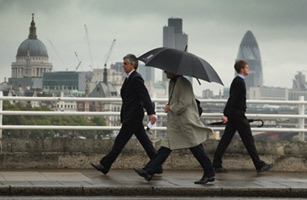
Raincheck London's place as one of the most important financial hubs in the world will remain, despite the recent economic storm
For more than 800 years, the church of St. Helen's in London's Bishopsgate has offered spiritual solace to those in need. Today, enveloped by the City, as London's financial quarter is known, St. Helen's has never seemed more like a sanctuary. As bankers lost their shirts amid the financial crisis, "We had individuals just walk in and say, 'My life's a mess, I don't know how I'm going to cope,'" says the Rev. Mark O'Donoghue, once a City lawyer but now a minister at St. Helen's.
With faith in finance at an all-time low, the clamor to put things right in the City is under way. As a crucial hub in the global financial system, Britain's financial-services industry has won itself few admirers in recent months. Undercapitalized and over-extended before the crisis, once proud banks such as Royal Bank of Scotland (RBS) have been largely nationalized. The City's reputation for light-touch regulation now haunts it. Britain's economy, far too reliant on finance in recent years, contracted by an estimated 4.5% last year.
With politicians and regulators eager to restore order, the market in suggestions for how the City should emerge from the crisis is buoyant. "It's important we don't get bogged down with, 'Oh my God, it's all over!'" says John Griffith-Jones, chairman of KPMG in the U.K. "As opposed to, 'O.K., that wasn't our finest hour, but bloody hell, we've gripped the issues.'" So how will London emerge from its toughest test in decades?
The City didn't cause the crisis; nor is it the only financial center tarnished. But as arguably the most internationally focused of the world's financial capitals, London has suffered an outsize share of the pain.
Self-inflicted injuries made things much worse. Debt-fueled growth meant some British banks quickly found themselves in a funding pickle as credit markets seized up. Others admitted to enormous trading losses. All told, taxpayers have stumped up $1.4 trillion in support for Britain's banks since the crisis began. Some 60,000 financial-services jobs have been lost.
Guarding against a repeat means tightening the rules that banks play by. Gone is the featherlight supervision of the Financial Services Authority (FSA), Britain's regulator. In its place, banks now expect far more rigorous scrutiny of their business models — and the extent to which they export risk to the rest of the financial system. While holding more capital and trustier assets should make banks less risky, it could also make for less money to pass around. "There will be a smaller banking sector," says Julian Franks, a finance professor at the London Business School. "And it's probably a good thing."
Much more contentious: regulating future pay for bankers. The FSA's get-tough approach includes moves to stop bankers' rewards from encouraging excessive risk-taking. And the British government has gone further, last month unveiling a new 50% tax on bonuses over roughly $40,000 — adding to plans for a higher rate of income tax on those earning more than $245,000 a year.
The bonus levy has stirred threats of an exodus from London. Tullett Prebon, a major brokerage, said it would help staff eager to relocate to places with "more certain taxation regimes"; Goldman Sachs began a review of its London operations, in part because of the new tax. Swiss authorities have hosted several seminars in London on the good life in Zurich and Zug. New York City Mayor Michael Bloomberg hailed the British levy last month as "an opportunity to ... bring those companies here."
Inevitably, some workers will move. Still, few right now could confidently predict a race to Heathrow (if you could race there, which, given London's awful traffic, you can't.) The real worry for London is the insidious effect of such changes. "If carbon-trading took off, where would its HQ go?" says KPMG boss Griffith-Jones. "It's not so much what they'll take away [from London], but what won't come here."
No one in London wants to lose a penny of business, but doing so hardly means the end of the City. London still has a lot going for it. Its location midway between the U.S. and Asia, flexible employment laws and its use of English all act as a long-term hedge against the impact of temporary taxes. Then there's the invisible infrastructure of the Big Smoke; the City is home to three of the world's top four law firms, countless insurance houses, accountants, consultants, skilled secretaries and good schools.
All of this explains why about half of Europe's investment-banking activity takes place in the City, and why it is still a world leader in cross-border lending. As Deutsche Bank CEO Josef Ackermann told the Financial Times in December. "London is a very attractive place to do business."
The truth is, the biggest threat to the City's status has little to do with the financial meltdown. The more that emerging economies like China and Brazil grow, the more their domestic stock and bond markets will expand. In the past, London picked up lots of that lucrative emerging market business. In the future, "as the Asian economies in particular mature, more international business will be settled out of there than out of London," says author Philip Augar. "There will be a gradual loss of market share for the City."
To the bankers marching past London's St. Helen's one recent lunchtime, that message seems to have been carried in the wind. Above its narrow bell tower, the church's weather vane held steady in a chilly wind. Its direction: steadfastly south.